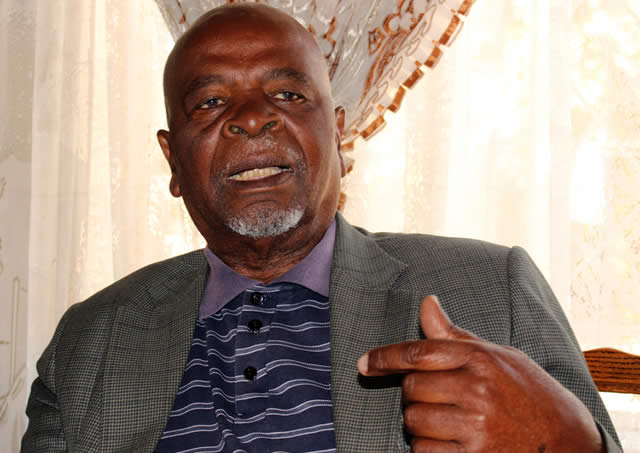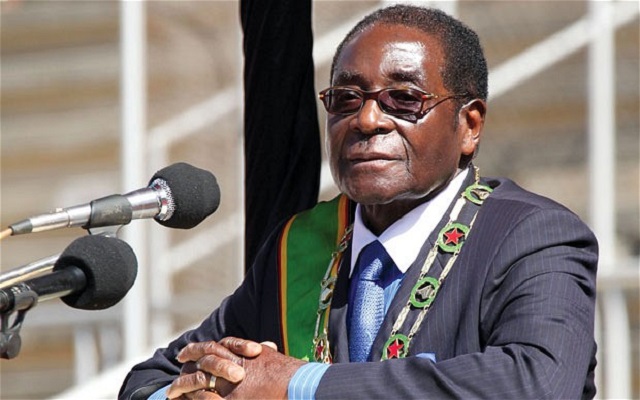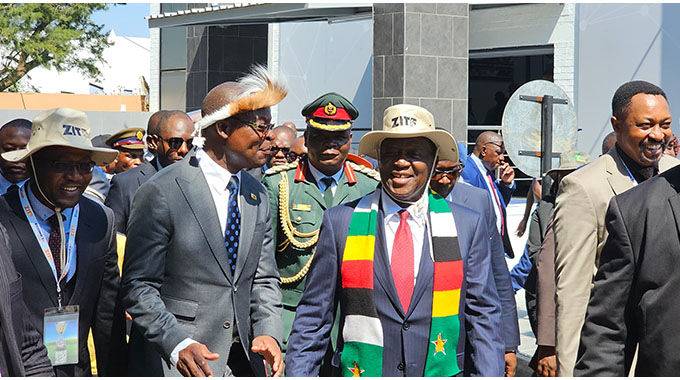Veteran nationalist Naison Ndlovu dies


The late former Deputy president of the Senate Cde Naison Khutshwekhaya Ndlovu’s widow Sithokozile (right) is consoled by neighbours and friends at her house in Luveve suburb yesterday after the passing on of her husband. — Pic by Dennis Mudzamiri
Auxilia Katongomara/Mashudu Netsianda, Chronicle Reporters
VETERAN nationalist Cde Naison Khutshwekhaya Ndlovu has died.
He was 86.
Cde Ndlovu, a Zanu-PF Central Committee member and former Deputy Senate President from 2008 to 2013, succumbed to prostate cancer in Suburbs, Bulawayo, at around 2AM yesterday.
His wife Sithokozile said Cde Ndlovu, who had been battling prostate cancer for a long time, passed on at his daughter’s home.
Cde Ndlovu, who was the National Chairman of PF-Zapu at the signing of the Unity Accord in 1987, was also the first black mayor of Bulawayo, assuming the post in 1981 and serving two terms.
He was the only surviving member from the PF-Zapu side involved in the initial talks towards uniting PF Zapu and Zanu.
The late nationalist made his last public appearance at Mpilo Central Hospital during the opening of the cancer unit and spoke about his struggle with the disease.
As news of Cde Ndlovu’s death spread yesterday afternoon, mourners began to gather at his Luveve suburb home.
Among the mourners were Zanu-PF senior officials Cdes Absalom Sikhosana and Molly Mpofu.
Cde Sikhosana described Cde Ndlovu as an astute leader and a fountain of wisdom.
“We are very devastated by this development because we were not expecting it. We thought from the assistance he was getting he would pull through, unfortunately this is what has happened. We are pained and shocked by the departure of the veteran and one of the founding fathers of our liberation,” he said.
“We have lost a fountain of wisdom, a fountain of knowledge and somebody whom we were looking up to for guidance and someone who was senior and experienced. We feel very empty. His departure leaves a void which will be very difficult to fill.”
Zanu-PF Politburo member, Cde Joshua Malinga, who is a nephew to Cde Ndlovu, described him as a committed, consistent and a very progressive man.
“He was always consistent and very progressive in thinking and deeds. He has been consistent, persistent before, during and after the liberation struggle till his death.
“On the Zapu side, he worked very well with others and rose through the ranks to become the party’s national chairman,” said Cde Malinga.
He said he first met Cde Ndlovu at Jairos Jiri Centre and the nationalist taught him leather craft.
As a former mayor, Cde Malinga said the late veteran leader provided the direction which all other mayors were to follow.
“It was not an easy job because he had to balance blacks and whites without seeming to be racist,” he said.
Cde Malinga said Cde Ndlovu, who was among the facilitators of the 1987 Unity Accord, always spoke of the need to revisit it.
“He always said while the Accord stopped the killings, there was a need to revisit it as affected people lost so much in terms of development. He felt that there was a need to create a fund to assist in bringing development to the affected areas,” he said.
“Cde Ndlovu was never a corrupt man and of late he was worried about the high levels of corruption in the country. He also loathed tribalism, which he said was retrogressive. And political wise he wasn’t happy about the factional fights in the ruling party.”
Former Matabeleland South Governor, Cde Angeline Masuku, said Cde Ndlovu was a principled, brave and disciplined man.
“Cde Ndlovu was a torchbearer who led some of us during the liberation struggle. I met him during the liberation struggle in Makeni in Zambia in 1977 and he was a brave and dedicated cadre who never diverted from what he believed in,” she said.
Cde Masuku said the late hero was her advisor who offered her sound advice on socio-political related issues.
“To me, Cde Ndlovu was a fountain of knowledge on political issues and he is a person you would depend on. In fact, he was my advisor together with Cde Jane Ngwenya and indeed we have lost a true hero, a tried and tested party cadre and may his soul rest in peace,” she said.
Zanu-PF chairman for Bulawayo Cde Dennis Ndlovu said he worked with the late Cde Ndlovu in 1980 when they were both councillors.
“I first worked with Cde Ndlovu when he was a PF-Zapu central committee member and we later worked together when he became mayor of Bulawayo and I was a councillor. From being mayor he was elected a Member of Parliament and we continued working together in Zanu-PF after the signing of the 1987 Unity Accord,” he said.
Cde Ndlovu was born in Gwatemba, Filabusi on October 22, 1930 and was educated at Zezani Secondary School in Beitbridge where he did Standard One and Two.
He went back to Gwatemba to finish Standard Three before proceeding to Wanezi Mission for Standard Six and later proceeded to Umzingwane Government School where he trained in leatherwork.
After attaining a certificate in leatherwork, Cde Ndlovu taught at Zezani School and Matopo Mission in 1950 and 1953 respectively before proceeding to Empandeni Mission.
His last teaching job was at Jairos Jiri Training Centre in Bulawayo from 1956 to 1965 before joining politics.
His life changed because he was continuously detained after the infamous Unilateral Declaration of Independence by Ian Douglas Smith.
Cde Ndlovu came to Bulawayo in 1956 and this was the time when the influence of the Southern Rhodesia African National Congress (SRANC) was beginning to be felt. He met other luminaries like the late Cde Joshua Nkomo.
The SRANC was strongly campaigning against the federation.
As the wind of African nationalism continued to blow across the continent, the Ian Smith regime became more brutal and many detention centres were set up at Khami, Gonakudzingwa, Marondera and other areas.
Soon after the banning of the SRANC, the National Democratic Party was formed and Cde Ndlovu was not in the leadership structures.
He, however became active when the NDP was banned in 1960 and succeeded by the Zimbabwe African People’s Union (ZAPU) in 1961.
He was co-opted into the structures of Zapu and the party had one district in Bulawayo which he represented as a committee member.
After the banning of Zapu around 1962, the People’s Caretaker Council was formed to lead the struggle.
Cde Ndlovu was very influential in the formation of the Bulawayo United Residents Association in 1962 and he was the first chairman deputised by the late Cde Sydney Malunga with Cde John Nkomo as secretary. He remained very active after the liberation struggle, although he was not very actively involved in central Government.
He became the first black councillor for Luveve in 1981, the same year he was elected Bulawayo mayor for a two-year term.
As a councillor and mayor, Cde Ndlovu will be remembered by the people of Bulawayo for calling for sitting tenants to buy the houses they had been renting for over 40 years.
Working with the first local Government Minister, the late Cde Eddison Zvobgo, Cde Ndlovu influenced the purchase of homes.
People who had been renting homes in Mzilikazi and Makokoba since the early 1940s were given the houses on the basis that they had already paid off the money through rentals.
Council under Cde Ndlovu took advantage of the schemes that were introduced by Cde Zvobgo while many other city councils resisted them.
Under the scheme, some houses were built in Emakhandeni, Entumbane and Nkulumane and people called them the “Zvobgo houses”.
In 1985 he contested for the Insiza Parliamentary Constituency, a seat he held until June 2000 when he lost to the MDC.He was representing one of the biggest constituencies in the country, covering Fort Rixon, Filabusi and parts of Esigodini and Gwanda. During his term as Member of Parliament for three terms and later as Senator for the same constituency, Cde Ndlovu did a lot for the area.
When he took over in 1985, it was immediately after independence and Ian Smith’s Government had done nearly nothing to improve the lives of Zimbabweans in the constituency.
He lobbied the Government to build clinics, schools, roads and dams and to rehabilitate some irrigation schemes.
Cde Ndlovu is survived by wife Sithokozile and two children.
Mourners are gathered at number 5649 Luveve 4 suburb.
@AuxiliaK











Comments